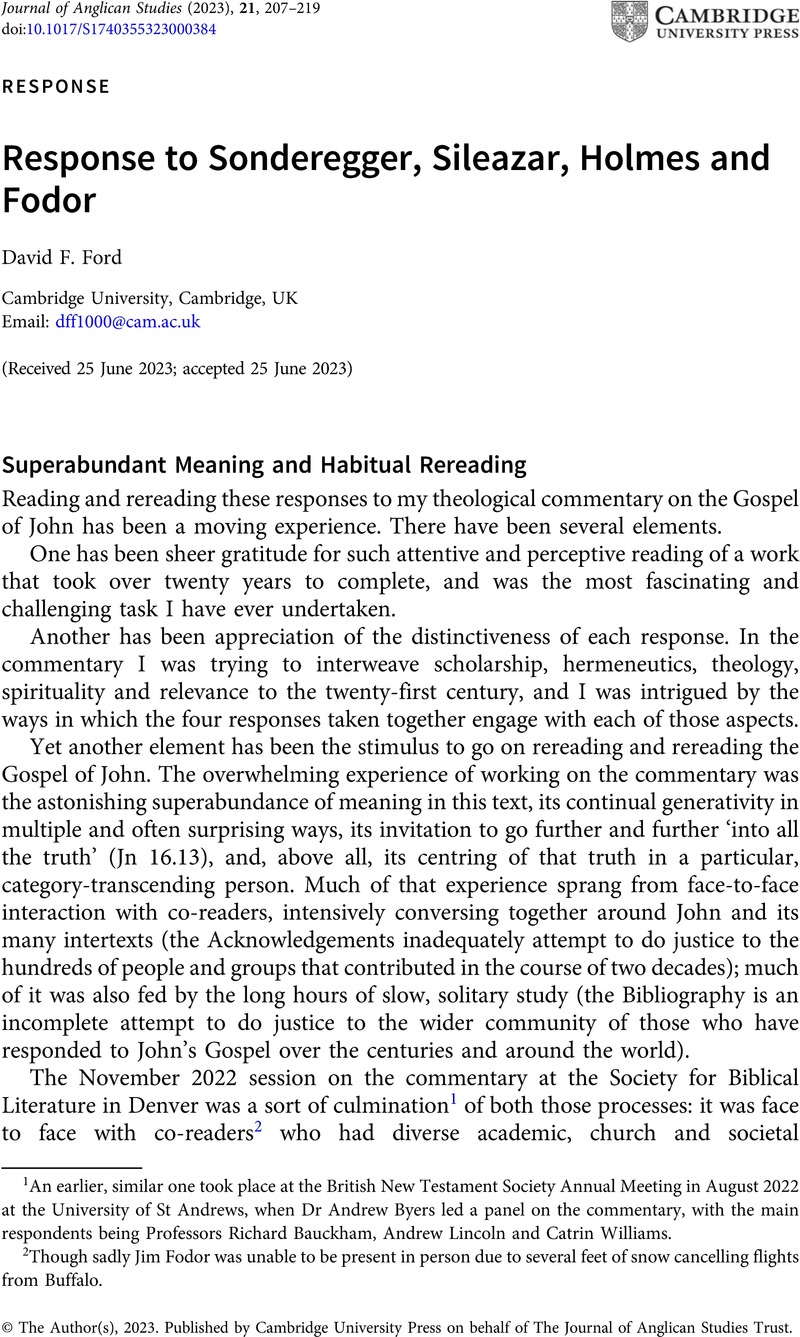No CrossRef data available.
Article contents
Response to Sonderegger, Sileazar, Holmes and Fodor
Published online by Cambridge University Press: 09 October 2023
Abstract

- Type
- Response
- Information
- Copyright
- © The Author(s), 2023. Published by Cambridge University Press on behalf of The Journal of Anglican Studies Trust
References
1 An earlier, similar one took place at the British New Testament Society Annual Meeting in August 2022 at the University of St Andrews, when Dr Andrew Byers led a panel on the commentary, with the main respondents being Professors Richard Bauckham, Andrew Lincoln and Catrin Williams.
2 Though sadly Jim Fodor was unable to be present in person due to several feet of snow cancelling flights from Buffalo.
3 This is powerfully advocated (with practical advice on how to become a habitual rereader) in the sadly neglected gem by the Anglican priest Alan Ecclestone, The Scaffolding of Spirit: Reflections on the Gospel of John (London: Darton, Longman and Todd, 1987).
4 Beverly Roberts Gaventa, ‘The Archive of Excess: John 21 and the Problem of Narrative Closure’ in R. Alan Culpepper and C. Clifton Black (eds.), Exploring the Gospel of John: In Honor of D. Moody Smith (Louisville, KY: Westminster John Knox Press, 1996), pp. 240-54.
5 Micheal O’Siadhail, The Five Quintets (Waco, TX: Baylor University Press, 2018).
6 The distinguished American interpreter of Irish literature, Professor Richard Rankin Russell, gives a striking overall verdict: ‘I am increasingly convinced it is the most important poetic work published since Milton’s Paradise Lost because it magisterially, yet winsomely, teaches us who we are because of who we have been – and who we might yet become.’ Richard Rankin Russell, Review of The Five Quintets in Irish Literary Supplement, Fall 2020, p. 20.
7 Forthcoming, as Frances M. Young, Doctrine and Scripture in the Early Church (2 vols.; Grand Rapids, MI: Eerdmans, 2023–24).
8 Peter Ochs, Another Reformation? Postliberal Christianity and the Jews (Grand Rapids, MI: Baker, 2011).
9 There is considerable irony in Frei giving this advice: he himself for the most part wrote things that ‘ordinary Christians’ do not find accessible.
10 For some further, post-commentary reflections, see David F. Ford, ‘Ultimate Desire: The Prayer of Jesus in John 17’, in Ashley Cocksworth (ed.), T&T Clark Handbook to Christian Prayer (London: T&T Clark, 2021), and ‘Mature Ecumenism’s Daring Future: Learning from the Gospel of John for the Twenty-First Century’, in Paul D. Murray, Paul Lakeland, and Gregory A. Ryan (eds.), Receptive Ecumenism as Ecclesial Learning: Principles, Practices, and Perspectives (Oxford: Oxford University Press, 2022).
11 There may be a parallel here to John naming the ‘kingdom of God’ in the first two waves of the conversation between Jesus and Nicodemus in John 3, but then in the third, culminating wave using his preferred terms such as eternal life, love and light. This may be to show readers of the Synoptic Gospels that he is well aware of the importance of the kingdom of God even if he generally uses other terminology.
12 Frances M. Young and David F. Ford, Meaning and Truth in 2 Corinthians (London: SPCK, 1987; Grand Rapids: Eerdmans, 1988. Reprint, Eugene, OR: Wipf & Stock, 2008).
13 For a discussion of this see David F. Ford, The Future of Christian Theology (Oxford: Wiley-Blackwell, 2011).
14 For two, see n. 10 above. Others include: ‘Reading Backwards, Reading Forwards, and Abiding: Reading John in the Spirit Now’, Journal of Theological Interpretation 2.1 (2017), pp. 69-84; ‘The Gospel of John and Contemporary Society: Three Major Theological Contributions’, in Andrew Byers (ed.), Religions, forthcoming; ‘“Receive the Holy Spirit”’, Interpretation: A Journal of Bible and Theology, 77.4 (October 2023); ‘John’, in Matthias Grebe and Johannes Grössl (eds.), T&T Clark Companion to Suffering and the Problem of Evil (London: T&T Clark, forthcoming); ‘Reading the Gospel of John and Hans Frei’s The Identity of Jesus Christ Together’, in Drew Collins and Ben Fulford (eds.), Generous Orthodoxy: Hans Frei and the Future of Theology, forthcoming.
15 Now available in Micheal O’Siadhail, Collected Poems (Tarset: Bloodaxe Books, 2013; and Waco, TX: Baylor University Press, 2018).
16 The deeply Johannine theology of Herbert is a theme in a study that has led me to ponder the desirability today of what it describes happening in early modern England: Paul Cefalu, The Johannine Renaissance in Early Modern English Literature and Theology (Oxford: Oxford University Press, 2017).
17 O’Siadhail, Collected Poems, 705.





